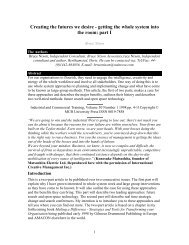From Old Economics to New Economics- Radical ... - Bruce Nixon
From Old Economics to New Economics- Radical ... - Bruce Nixon
From Old Economics to New Economics- Radical ... - Bruce Nixon
Create successful ePaper yourself
Turn your PDF publications into a flip-book with our unique Google optimized e-Paper software.
5. Theoretical foundations of <strong>New</strong> <strong>Economics</strong><br />
In fact, it may be discovered that the true veins of wealth are purple – and not in rock, but in flesh –<br />
perhaps even that the final outcome and consummation of all wealth is in the producing as many as<br />
possible full-breathed, bright-eyed, and happy-hearted human creatures. Our modern wealth, I think,<br />
has rather a tendency the other way. 12<br />
5.1. Grandfathers and fathers of new economics<br />
The idea that there is more <strong>to</strong> life than the pursuit of money, and that the pursuit of well-being<br />
should be the real goal of a society is certainly not new. Neither is the sense that the focus on<br />
accumulating material wealth might actually be harmful <strong>to</strong> people’s well-being, both<br />
individually and collectively. The quote above is taken from John Ruskin’s series of essays on<br />
economics from the 1860s, written in response <strong>to</strong> Ruskin’s view that an overly mechanistic<br />
approach <strong>to</strong> political economy was being taken by his contemporaries.<br />
While Ruskin did not pretend that people were never motivated by financial rewards and<br />
punishments, he did contend that this was a very poor means of doing so, and that social<br />
‘affections’ were much the more powerful motivating force. By ignoring these fac<strong>to</strong>rs,<br />
economists give at best a partial picture of reality and, at worse, a dis<strong>to</strong>rtion:<br />
I neither impugn nor doubt the conclusion of the science if its terms are accepted. I am simply<br />
uninterested in them, as I should be in those of a science of gymnastics which assumed that men had no<br />
skele<strong>to</strong>ns. It might be shown, on that supposition, that it would be advantageous <strong>to</strong> roll the students up<br />
in<strong>to</strong> pellets, flatten them in<strong>to</strong> cakes, or stretch them in<strong>to</strong> cables…The reasoning might be admirable,<br />
the conclusions true, and the science deficient only in applicability. Modern political economy stands<br />
on a precisely similar basis. Assuming, not that the human being has no skele<strong>to</strong>n, but that it is all<br />
skele<strong>to</strong>n. 13<br />
Ruskin also ex<strong>to</strong>lled the virtues of cooperation rather than competition, arguing that the latter<br />
was very often a case of ‘beggar thy neighbour’, which left <strong>to</strong>tal wealth – or well-being – less<br />
than if the parties where <strong>to</strong> cooperate. Ruskin’s argument finds its modern echo in the work of<br />
game theory, where ‘prisoner’s dilemma’ scenarios highlight the same essential point:<br />
cooperation often leads <strong>to</strong> superior outcomes than competition; ‘reciprocal altruism’ is the<br />
most successful strategy.<br />
Ruskin was particularly scathing on the issue of market exchange, which by definition in his<br />
view, is a zero sum game where one party’s gain is exactly equivalent <strong>to</strong> another’s loss. Given<br />
that the parties <strong>to</strong> an exchange will generally have different levels of information and<br />
different relative strengths regarding the transaction, it is inevitable that one party does well<br />
out of the deal and other does not.<br />
This is also the case with employment, where employers are taught by the principles of<br />
economics that they should pay the minimum required in the market <strong>to</strong> secure the needed<br />
workers. For Ruskin, however, work should have an intrinsic value, where ‘just payment’ for<br />
an hour’s work, for example, should be that which enables the worker <strong>to</strong> purchase the same<br />
amount of labour from another person. Where the supply of workers exceeds demand,<br />
however, wages will be driven down below this level, enabling the employer <strong>to</strong> take on more<br />
workers at low wages, thus concentrating economic power in the hands of the few.<br />
A requirement <strong>to</strong> pay ‘just wages’, in contrast, would disperse economic power throughout a<br />
longer ‘chain’ of people, with each being able <strong>to</strong> purchase the labour of just one other worker,<br />
12 John Ruskin, Un<strong>to</strong> This Last (1862)<br />
13 Ibid.<br />
23



